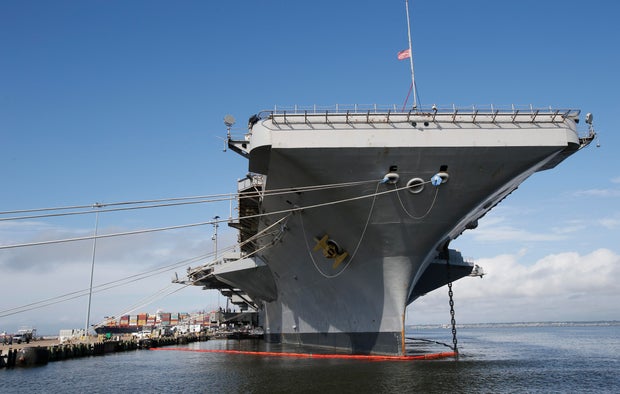The Navy’s investigation into the suicides of three sailors assigned to the USS George Washington concluded the deaths were not connected, but stress related to life in a shipyard environment was a “contributing factor” in at least one of the suicides.
In April, Master-at-Arms Seaman Recruit Xavier Mitchell-Sandor, 19, Interior Communications Electrician 3rd Class Natasha Huffman, 24, and Retail Services Specialist 3rd Class Mika’il Sharp, 23, died by suicide within days of one another, raising questions about the conditions on ships undergoing overhauls as well as access to mental health resources. The investigation said it appeared the living conditions aboard the ship was a “contributing factor” in Mitchell-Sandor’s death by suicide.
Though the investigation released Monday concluded the deaths were not directly connected and that ultimately independent personal struggles led each sailor to suicide, it does provide more details about the conditions of shipyard life and the “overwhelming” stress on mental health resources.
The GW has been docked in Virginia since 2017 while undergoing a years-long overhaul that in the long term will extend the aircraft carrier’s service life but in the short term makes parts of the ship essentially a construction zone.
Steve Helber / AP
Of the three sailors, only Mitchell-Sandor lived aboard the ship in the months leading up to his death. During those months, Mitchell-Sandor told his friends and family he would often sleep in his car instead of the ship due to the living conditions, according to the investigation.
The conditions included construction noises like needle gunning and bells going off in addition to cold temperatures and periods without hot water or power.
Mitchell-Sandor found it hard to transition into this environment and assimilate into the Navy. He missed home and regularly drove hours away to see his girlfriend or family and then, without sleeping, would drive back for his shifts. The investigation found chronic sleep deprivation and fatigue may have affected his judgement and led him to believe suicide was his only option.
In the months preceding his death, Mitchell-Sandor was offered an opportunity to move to a better location but rejected it. The investigation states more senior sailors or an assigned mentor should have encouraged him to take the opportunity.
“This was the time for intrusive leadership,” the investigation said.
The investigation found that it did not appear there was an assigned mentor for Mitchell-Sandor or the other two sailors. The GW was the first ship assignment for all three of the sailors.
The Navy is conducting a broader investigation into the quality of life aboard ships undergoing extended maintenance periods in shipyards. That second investigation will provide recommendations to address some of the challenges raised in the initial investigation.
The initial investigation released Monday also raised concerns about the Navy’s bandwidth to provide mental health services.
Even before the three sailors’ deaths in April 2022, mental health providers for the GW described the patient volume as “overwhelming,” according to the investigation.
Of the three sailors, only Huffman sought mental health services before her death.
The investigation suggested junior sailors don’t always feel comfortable seeking support. For instance, it stated that “multiple sailors reported leadership doesn’t want to talk about, or otherwise feels uncomfortable talking about, mental health issues with junior sailors.”
Since the three suicides, the Navy has surged additional support to the GW to ensure sailors seeking support services are accommodated.
“We have taken a number of additional steps to provide for the care and well-being of our service members but the bottom line is that we can, and will, do more for our Sailors and their families,” said Rear Adm. John F. Meier, commander, Naval Air Force Atlantic, in a statement.
Months after the three GW sailor suicides, four sailors assigned to the Mid-Atlantic Regional Maintenance Center (MARMC) in Norfolk, Virginia, died by suicide within a month.
Defense Secretary Lloyd Austin when asked earlier this month about the rash of Navy deaths by suicide said, “We know there’s a concern across the board for access to mental health, and there’s a shortage of resources, so we’re doing as much as we can to invest in the resources and we want to make sure all of our leadership is doing the right things as well.”
Service members and veterans who are in crisis or having thoughts of suicide, and those who know a service member or veteran in crisis, can call the Military Crisis Line/Veterans Crisis Line for confidential support 24 hours a day, seven days a week, 365 days a year. Call 1-800-273-8255 and Press 1 or text 838255 or chat online at VeteransCrisisLine.net/Chat.
